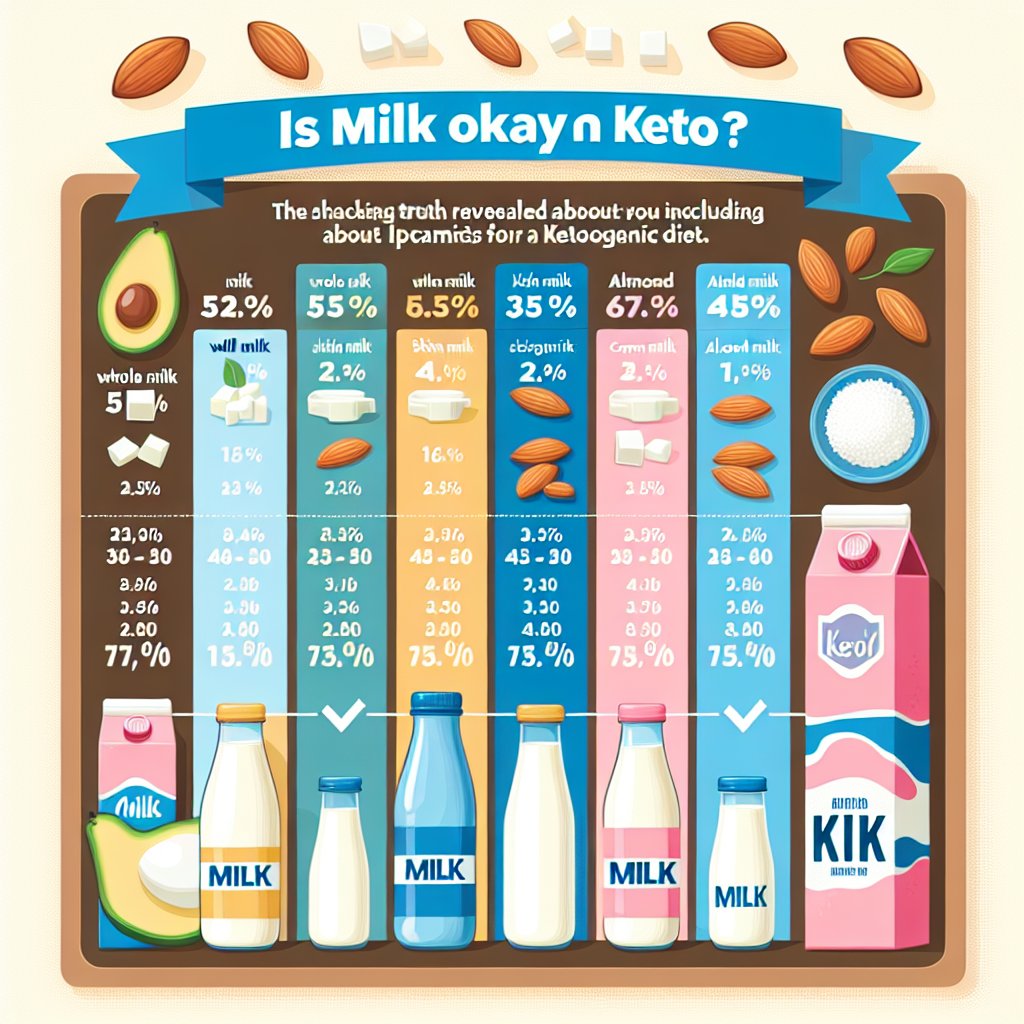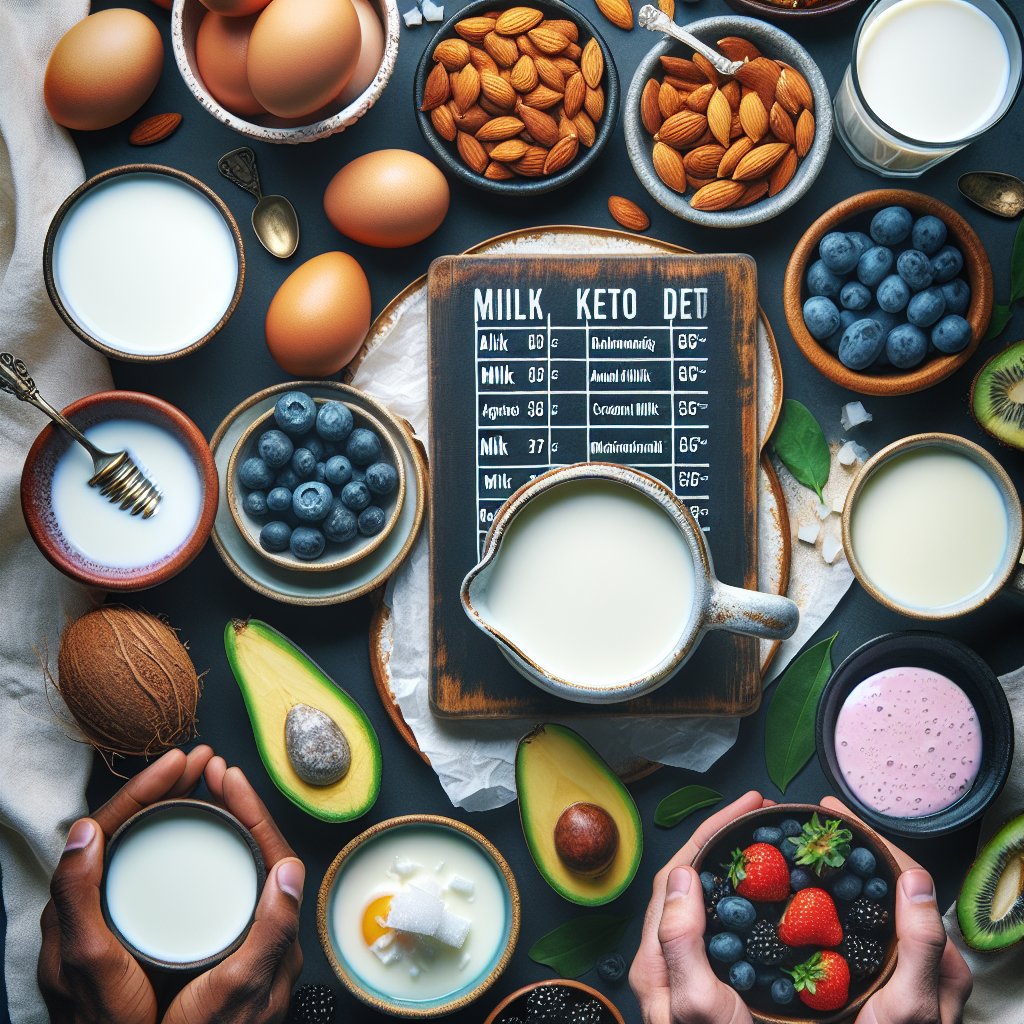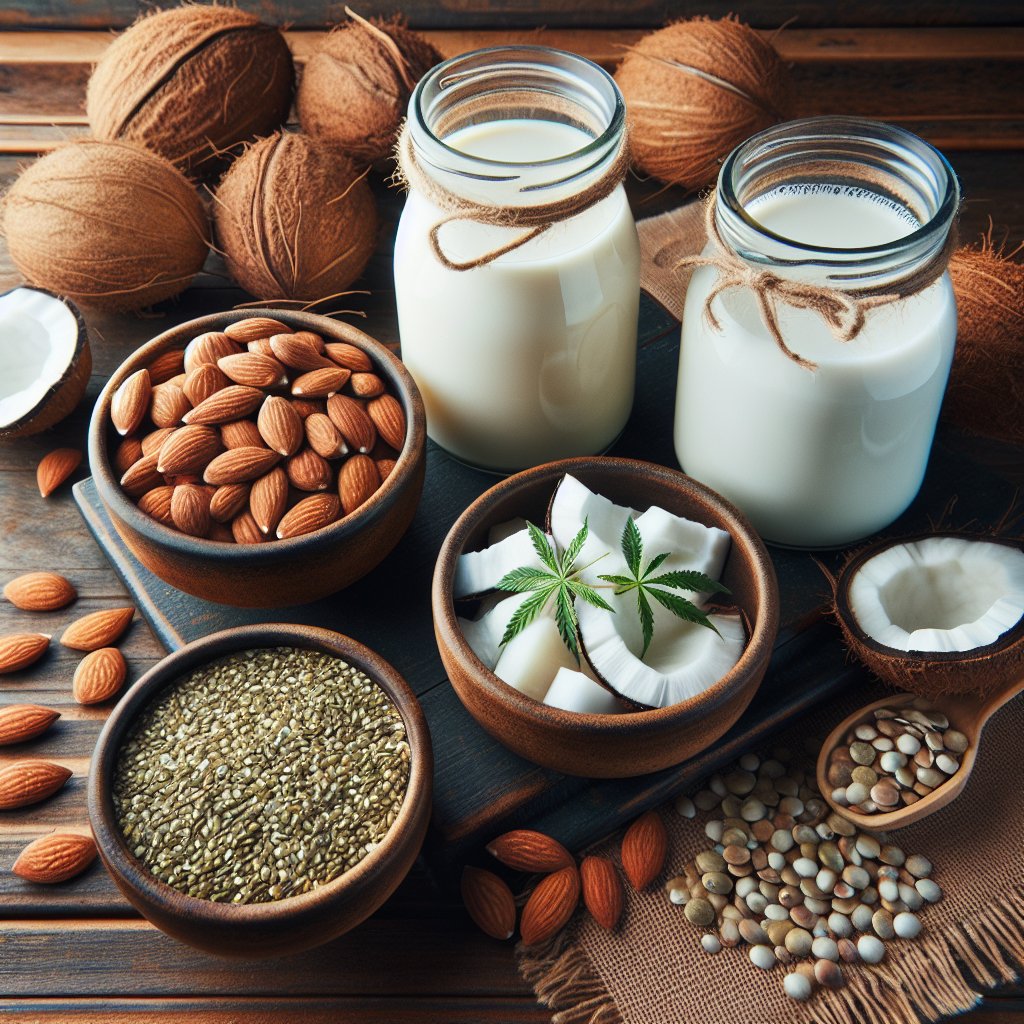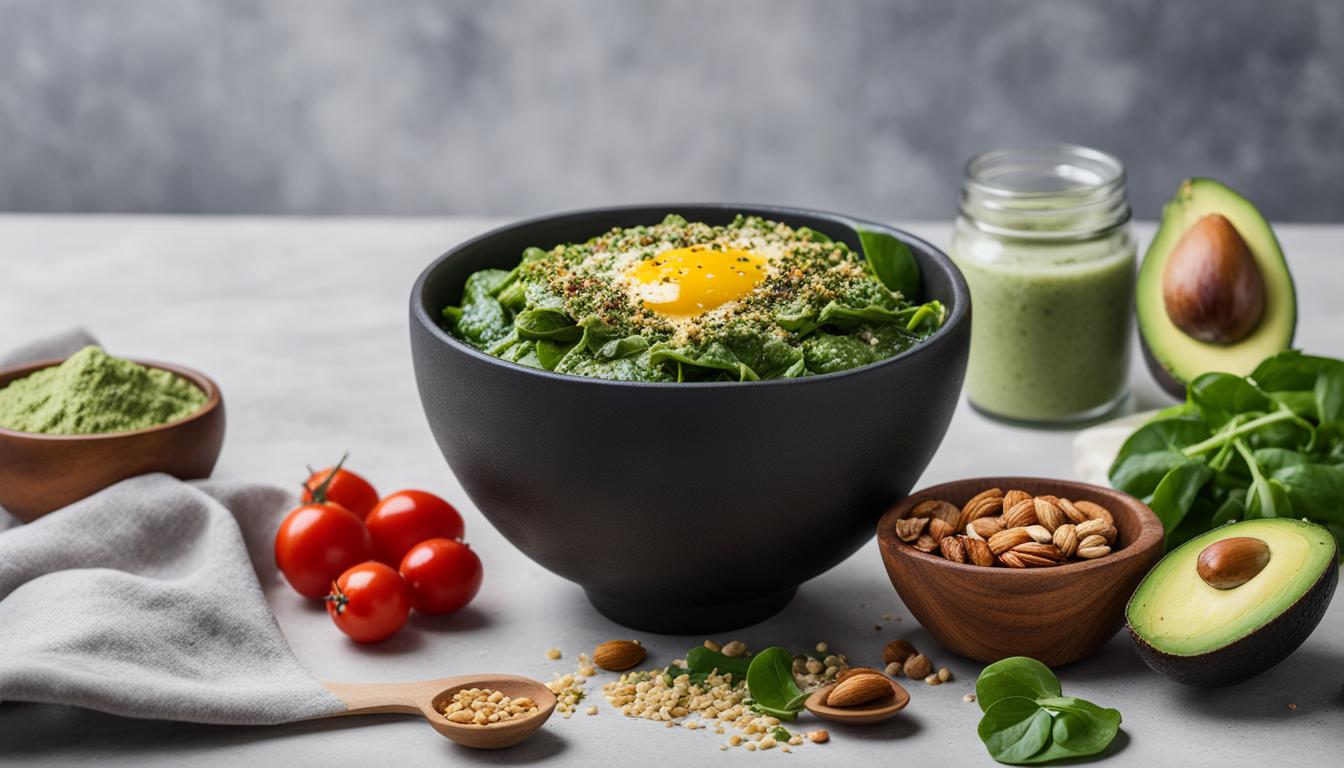Is Milk Okay on Keto? The Shocking Truth Revealed About Including Milk in Your Ketogenic Diet!
Is Milk Okay on Keto? The Shocking Truth Revealed About Including Milk in Your Ketogenic Diet!
Welcome to our in-depth exploration of a common question in the keto community: Is milk okay on keto? The ketogenic diet, or keto diet, has gained a lot of attention for its potential health benefits and weight loss effects. It is a low-carb, high-fat diet that offers various benefits and restrictions, and one of the key elements of this way of eating is the inclusion of specific foods while excluding others.
When it comes to dairy, particularly milk, there can be some confusion about whether it aligns with the principles of the ketogenic diet due to its carbohydrate content. In this article, we will dive into the science and explore the implications of including milk in a ketogenic lifestyle, uncovering the shocking truth about its compatibility with the keto diet.

Nutritional Profile of Milk
When it comes to the ketogenic diet, understanding the macronutrients found in milk is crucial. Milk contains carbohydrates, fats, and proteins, and each type of milk has different carb content.
Carbohydrates in Different Types of Milk
Let’s take a look at the carb content in different types of milk:
Whole Milk: A one-cup serving of whole milk contains approximately 12 grams of carbohydrates. It’s important to be mindful of this when including whole milk in your keto diet, as the carb content can add up quickly.
Skim Milk: In contrast, a one-cup serving of skim milk contains around 11-12 grams of carbohydrates. While it has a slightly lower carb content than whole milk, it’s still essential to factor this into your daily carb allowance on keto.
Almond Milk: Unsweetened almond milk tends to be a popular choice for those following a ketogenic lifestyle. It typically contains only 1-2 grams of carbohydrates per one-cup serving, making it a lower-carb alternative to traditional dairy milk.
Considering the carb content in different types of milk is vital for maintaining ketosis. While whole and skim milk may contain higher levels of carbohydrates, almond milk offers a low-carb option for those craving a milk substitute.
Next, let’s explore the fat and protein components of milk.

Impact of Milk on Ketosis
Is Milk Okay on Keto? The Shocking Truth Revealed About Including Milk in Your Ketogenic Diet!
When it comes to following a ketogenic diet, one of the most commonly asked questions is whether milk is okay to consume. After all, milk is a staple in many households and is often seen as a healthy source of nutrients. However, its impact on ketosis is a topic of debate among keto enthusiasts. Let’s delve into the science to understand how milk consumption can affect ketosis and whether the carb content in milk can potentially kick someone out of ketosis.
Understanding Ketosis
Before we dive into the impact of milk on ketosis, it’s essential to understand what ketosis is. Ketosis is a metabolic state in which the body burns fat for fuel instead of carbohydrates. This process occurs when the body’s glucose stores are depleted, leading to the production of molecules called ketones as an alternative fuel source.
The Carb Content in Milk
One of the primary concerns regarding milk consumption on a keto diet is its carbohydrate content. Milk naturally contains lactose, a type of sugar, which contributes to its carb content. An 8-ounce (240ml) serving of whole milk contains approximately 12 grams of carbohydrates, of which all are from sugar.
Impact on Ketosis
Research indicates that consuming high-carb foods, including those with lactose, can potentially kick someone out of ketosis. The body’s insulin levels can rise in response to the carb intake, which in turn can hinder the production of ketones. This can temporarily disrupt the state of ketosis and may take some time to re-enter the metabolic state once the excess carbs are burned off.
However, the impact of milk consumption on ketosis can vary from person to person. Some individuals may be able to include small amounts of milk in their keto diet and remain in ketosis, while others may find it more challenging due to their body’s sensitivity to carbohydrates.
In conclusion, while milk can be a nutritious beverage, its carb content has the potential to affect ketosis, especially if consumed in large quantities. It’s essential for individuals following a keto diet to be mindful of their carb intake from all sources, including milk, and to monitor their body’s response to determine if milk is okay for them on keto.
If you’re considering including milk in your keto diet, it’s advisable to opt for lower-carb alternatives such as unsweetened almond milk or coconut milk, which contain fewer carbs and can be compatible with a ketogenic lifestyle.

Alternatives to Milk on Keto
When it comes to following a ketogenic diet, dairy milk may not be the best option due to its higher carbohydrate content. However, there are plenty of delicious keto-friendly milk alternatives that you can enjoy while reaping numerous health benefits. Let’s explore some popular options and compare their nutritional profiles to that of regular milk.
Almond Milk
Almond milk has become a staple in the diets of many individuals following a keto lifestyle. It is low in carbohydrates and calories, making it an excellent choice for those aiming to maintain ketosis. Unsweetened almond milk typically contains only 1-2 grams of carbohydrates per serving, making it a great option for those watching their carb intake.
Furthermore, almond milk is rich in healthy fats, particularly monounsaturated fats, which have been associated with a reduced risk of heart disease and improved insulin sensitivity. It also contains vitamin E, which acts as a powerful antioxidant in the body, protecting cells from damage caused by free radicals.
Coconut Milk
Coconut milk is another fantastic alternative to dairy milk for individuals on a ketogenic diet. It is naturally low in carbs and high in healthy fats, including medium-chain triglycerides (MCTs). MCTs are easily converted into ketones by the liver, providing a quick and efficient source of energy for the body and brain.
Additionally, coconut milk contains lauric acid, a type of saturated fat with potential antimicrobial and antiviral properties. While it is higher in calories compared to almond milk, its rich, creamy texture is perfect for adding a touch of indulgence to your keto-friendly recipes.
Hemp Milk
Hemp milk is derived from the seeds of the hemp plant and has gained popularity as a dairy alternative due to its impressive nutritional profile. It is a good source of omega-3 and omega-6 fatty acids, which play a crucial role in supporting overall heart and brain health.
Moreover, hemp milk is naturally low in carbohydrates and contains all nine essential amino acids, making it a complete protein source. It also provides a healthy dose of vitamins and minerals, including calcium, vitamin D, and vitamin B12, which are essential for bone health and overall well-being.
Comparing Nutritional Profiles
Now, let’s compare the nutritional profiles of these keto-friendly milk alternatives to that of regular milk. A standard cup of whole dairy milk contains around 12 grams of carbohydrates, primarily from lactose, while almond milk, coconut milk, and hemp milk typically range from 1 to 3 grams of carbohydrates per cup. Additionally, dairy milk contains higher levels of naturally occurring sugars, whereas the keto-friendly alternatives are often unsweetened, minimizing added sugars.
Furthermore, the keto-friendly milk alternatives are generally higher in healthy fats and lower in calories compared to regular milk, making them ideal choices for individuals looking to maintain ketosis while enjoying the creamy goodness of milk in their recipes and beverages.
Ultimately, when it comes to following a ketogenic diet, these delicious and nutrient-rich milk alternatives provide a wide array of benefits without compromising your dietary goals. Whether you choose almond, coconut, or hemp milk, you can rest assured that you are making a keto-friendly choice that supports your overall well-being.

Benefits of Consuming Milk on Keto
When it comes to the ketogenic diet, there’s a lot of debate about whether milk has a place in the meal plan. While it’s true that milk contains lactose – a type of natural sugar – it also offers a range of important nutrients that can be beneficial for keto followers.
Nutrients in Milk
First and foremost, milk is an excellent source of high-quality protein. This macronutrient is essential for maintaining and building muscle mass, and it also plays a crucial role in supporting a healthy metabolism. Additionally, milk contains essential vitamins and minerals such as calcium, potassium, and phosphorus. These nutrients are vital for bone health, electrolyte balance, and overall well-being.
Moreover, the presence of conjugated linoleic acid (CLA) in milk has drawn attention for its potential benefits in weight management and improved body composition. Research suggests that CLA may support fat loss and help preserve lean body mass, making it an intriguing component for those on a ketogenic diet.
It’s important to note that while milk does contain natural sugars, its nutrient density should not be overlooked. When consumed in moderation, the valuable nutrients in milk can complement a ketogenic lifestyle and contribute to overall health and wellness.
Therefore, incorporating milk in moderation on a ketogenic diet can offer a range of potential benefits, including the provision of essential nutrients such as protein, vitamins, and minerals, and the potential support for weight management through the presence of CLA.
Drawbacks of Consuming Milk on Keto
While milk is a popular and delicious beverage, it may not be the best choice for those following a ketogenic diet due to several potential drawbacks.
Lactose Content
One of the primary concerns with consuming milk on a keto diet is its lactose content. Milk contains a significant amount of lactose, a type of natural sugar. For individuals who are sensitive to lactose or are aiming to minimize their carbohydrate intake, the lactose in milk can pose a challenge. Consuming lactose can potentially lead to a spike in blood sugar levels, which is not ideal for those striving to maintain a state of ketosis.
Potential Insulin Response
Another drawback of consuming milk on a keto diet is the potential insulin response it may trigger. Insulin is a hormone that can promote the storage of glucose (sugar) as fat if its levels are elevated in the body. Some individuals may experience an increase in insulin levels after consuming milk, which can interfere with the fat-burning process that is essential for achieving and maintaining ketosis.
Risk of Consuming Too Many Carbs
Additionally, milk can contribute to the daily carbohydrate count, and it’s crucial for individuals on a ketogenic diet to carefully monitor their carb intake. A single cup of milk can contain around 11-12 grams of carbohydrates, which can add up quickly, especially if other carbohydrate-containing foods are being consumed throughout the day. Exceeding the daily carb limit can disrupt ketosis and hinder progress towards achieving the desired metabolic state.
Considering these factors, it’s essential for individuals following a keto diet to be mindful of the potential drawbacks of consuming milk and to explore suitable alternative options that align with their dietary goals.
While milk holds nutritional benefits, including essential vitamins and minerals, its carbohydrate and lactose content may not be the most compatible with the keto lifestyle. Being aware of these considerations can help individuals make informed choices regarding the inclusion of milk in their ketogenic diet.
Summarize the Key Points
In this article, we’ve explored the topic of including milk in a ketogenic diet. We’ve delved into the nutritional content of milk, its potential impact on ketosis, and discussed alternative milk options for those on a keto diet. We’ve also highlighted the importance of mindful consumption and understanding individual tolerance to milk’s components. Additionally, we’ve provided practical tips for making informed choices about including milk in your keto lifestyle.
Is Milk Okay on Keto?
So, the burning question – is milk okay on keto? The answer isn’t a straightforward yes or no, as it ultimately depends on individual factors and goals. Milk contains lactose, a naturally occurring sugar, which can affect ketosis due to its potential to elevate blood sugar levels. However, milk also provides essential nutrients such as protein, calcium, and vitamins.
For some individuals, small to moderate amounts of whole milk, particularly in the context of a well-planned and carb-controlled keto diet, may not significantly hinder ketosis. Nonetheless, it’s crucial to monitor your body’s response and adjust your milk consumption based on your personal goals and how your body reacts to it.
Nutritional Content of Milk
Whole milk: One cup of whole milk (about 240ml) contains around 12g of carbohydrates, primarily from lactose, which can potentially impact ketosis if consumed in large quantities.
Protein content: Milk is a good source of protein, with one cup providing approximately 8g.
Calcium and vitamins: Milk is rich in essential nutrients such as calcium, vitamin D, and vitamin B12, which are beneficial for bone health and overall well-being.
Impact on Ketosis
The lactose in milk can elevate blood sugar levels, potentially disrupting ketosis. However, moderate consumption of milk, particularly in coffee or recipes, may not significantly hinder ketosis for some individuals. Monitoring your ketone levels and how your body responds is crucial in determining the impact of milk on your ketosis.
Alternative Milk Options for Keto
For those seeking lower-carb alternatives, unsweetened almond milk, coconut milk, or macadamia milk can be excellent choices. These options generally have lower carbohydrate content and can be suitable for a ketogenic lifestyle.
Mindful Consumption and Individual Tolerance
It’s essential to be mindful of your overall carbohydrate intake from all sources, including milk, and consider individual tolerance to lactose and dairy products. Some individuals may be more sensitive to the impact of milk on their ketosis and overall well-being.
Practical Tips for Including Milk in Your Keto Lifestyle
If you choose to include milk in your keto diet, consider using small amounts in recipes or coffee and account for the carbohydrates in your overall daily intake. Opt for whole milk over reduced-fat versions, as they often contain added sugars to compensate for the reduced fat content.
Conclusion
So, is milk okay on keto? The answer lies in the balance between individual tolerance, nutritional needs, and mindful consumption. If you enjoy milk and are mindful of your carbohydrate intake, incorporating small to moderate amounts of whole milk in your keto diet may be feasible for some individuals. However, monitoring your body’s response and considering alternative milk options can also be beneficial. Ultimately, the decision to include milk in your keto lifestyle should be based on your unique goals and how your body responds to it.


